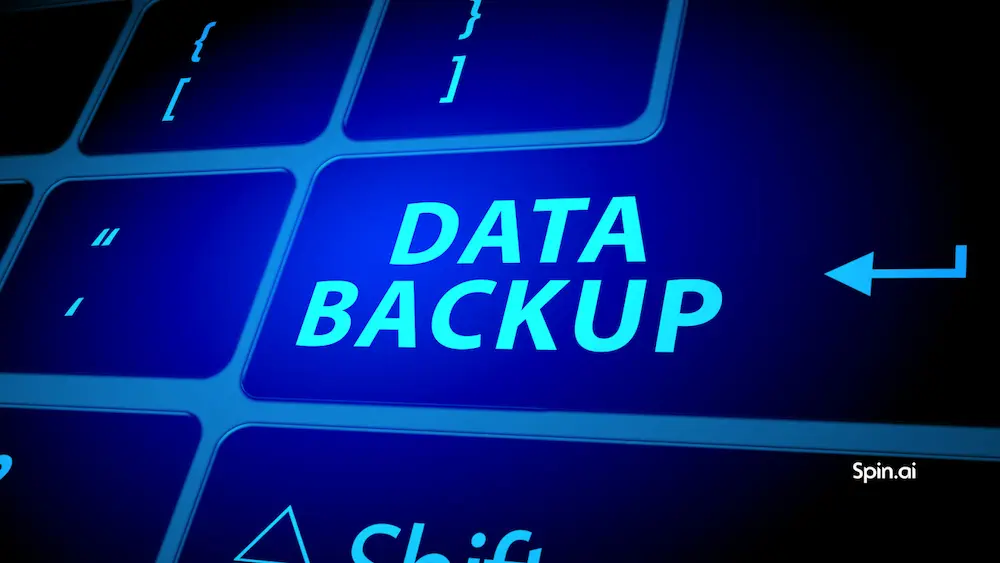Office 365 Cloud Backup vs. On-Premise Backup: Where to Store my Data?
Continuous backup is crucial for your business, especially when all operations rely on data, to ensure protection against potential data loss and mitigate the risk of data breaches or system failures. The question you might be asking is “How exactly should I backup my Office 365 for it to be continuous and safe?”. Should you choose an onsite or offsite storage solution? In this article, we are going to compare Office 365 cloud backup vs. on-premise tools.
We will weigh all the strengths and weaknesses of each approach and use our clients’ case studies to help us. By the end of the article, you will come up with a clear vision for your business on which backup method to choose.
Office 365 On-Premises: Pros & Cons
On-premises backup (or local backup) is a type of hardware or software that stores your data locally onsite or offsite without the involvement of third parties. It is physical storage your company owns. Some time ago it was disks and tapes; now it’s hard drives and servers.
You can compare going to on-premises with buying an apartment without any previous repair: you have full freedom to create whatever you want with it, on your terms. But you have to pay a high price for such independently-managed software.
Pros:
- Customizability. It means that if you do your Office 365 backup on-premises there will be no price hikes for storage and you can customize the software specifically for the needs of your company. It’s up to you how to configure the infrastructure which is most comfortable for your company.
- High backup speed. The reason behind it is that data doesn’t have to be transmitted through different networks to be saved. Also, it doesn’t need to be encrypted and sent through a secure Internet connection so the process can go faster.
- Full autonomy. It is your IT and security department, which solves all security and maintenance issues. Since these people work for your company, they are interested in fixing problems as fast as possible and have more resources to do that.
- High upload speed. If you keep all your servers and hard drives onsite, you can upload your data very fast.
Cons:
- Setup and maintenance. Like with buying an apartment, it’s on you to do all the repairs. It’s your responsibility to install, configure, and deploy the software, to monitor the connection and security, to troubleshoot, and so on. It will take more time and money to keep the whole system afloat.
- Low scalability. Your abilities to scale your business depend on the number of physical storage your company possesses.
- Exposure to physical damage. Hard drives don’t last forever and can be easily damaged by overheating, water, or fire.
Office 365 Cloud Backup: Pros & Cons
Cloud backup solutions don’t require you to own hardware, because they store your data in their own data centers with many different servers. It means that all the infrastructure and data are on the Internet, encrypted, and accessible on demand.
Having a cloud backup is like renting an apartment. Yes, the vendor uses the same physical tools which are susceptible to damage. But in this case, it is their responsibility to take care of that. You are only paying your rent, moving in, and starting to live there – everything is ready-to-use.
Pros:
- No setup and maintenance is required. All infrastructure is already installed and configured for you.
- High scalability. Cloud backup services can scale up and down on your request. The amount of storage cloud backup services offer is, in most cases, unlimited. If you need to backup more accounts, you can buy new licenses, and they’re in the bag. In the same way, you can delete these accounts if you don’t need them anymore.
- No overheads are required. You have a settled price, which includes everything to start backing up immediately.
- Safety from physical damage. Floods and fires are no longer a threat to cloud backup.
- Compliance confidence. Global companies must meet compliance regulations, and it is much easier to do so using public clouds. Furthermore, the public cloud offers all the security and certifications required, including those for government agencies.
Cons:
- No customization. In cloud backup, you are just one of the tenants who rents a well-structured cloud space. You are not the owner of this space, so you can’t set up your own rules or make significant changes. You either accept the existing rules or do not rent it at all.
- Reliance on third parties. When it comes to dealing with security or maintenance issues, you have to address these issues with the support team of the vendor. The speed and quality of their response always depend on the policy of the cloud backup service.
- Lower upload speed than that of on-premises backups. Depending on the internet connection, it can take a week to upload or restore terabytes of data. But backing up such a vast amount of data is usually a one-time operation on the initial backup stage.
Is cloud more expensive than on-premises?
Let’s count all financial gains and losses accompanying both types of backups.
The cost of on-premises backups
Although the on-premises option is usually considered a cheaper one, this is not entirely true. IDC reports that the number one reason organizations move backup and recovery to the cloud is simple economics. The most widespread argument for using on-premises backup is that with on-premises, unlike with cloud backups, you pay a higher price up-front, and then you are free from expenses. In reality, things work slightly differently.
Expenditure on the on-premises backups:
- High up-front expenses on the establishment of hardware and software systems;
- Costs on regular updating, maintaining, and upgrading those systems;
- Overheads on human capital. With on-premises, you need people for setting up and maintaining the software and hardware, taking care of security, troubleshooting, and occasional repairs. The more data you have, the more servers you need, and these servers must be maintained properly.
- Overheads on electricity. To run multiple processors, you need large volumes of electricity, and the more data you have, the more power you need.
- Expensive scalability. Your business may need more or less storage, depending on the number of employees and the amount of data. For more on-premises storage, you need to add more storage space to the system, or you need to add more systems – new servers and hard drives to support the software. But if you don’t need that space anymore, this machinery will stand idle.
For example, a company wants to support 5,000 users in Office 365. Here are their following expenses:
- 5 VMs running for each monthly backup: $1000/month
- 5 GB/user, or 50TB of storage: $1000/month
- $1.50/user/month for license 5,000 users: $7,500/month
The total cost is $9,500/month plus the cost of headcount.
The cost of cloud backup
Cloud backup always has a fixed price, which you can pay monthly or annually. For some backup services, the price can vary depending on the amount of storage your business needs and additional features the service can provide. Your regular payments cover everything: infrastructure, storage, maintenance, migration, tight security monitoring, dealing with system breakdowns, and so on.
Expenditure on the cloud backups:
- Fixed monthly/annual payments you are tied to.
- The more employees you have, the more monthly-paid account licenses you need to buy.
This is pretty much all.
Is cloud service more secure than on-premises?
Now let’s figure out how secure are both backups.
Security threats of on-premises backup solutions
The security of your on-premises solution is all on you. Having an on-premises backup is like having all eggs in one basket: you drop it – you crack all of them. It depends on your IT department how strong the protection of your Office 365 data will be, and how to recover in case of disaster.
Here are the possible risks for on-premises backups:
- Natural disasters: floods, fires, earthquakes, and other emergencies. The cost of data recovery in this scenario can be exorbitant;
- Data theft;
- Administrative errors.
Security threats of cloud backup services
In the case of cloud backup, all security concerns lay on the vendor’s shoulders. The biggest cloud vendors, like Amazon Web Services (AWS), Google Cloud Platform (GCP), and Microsoft Azure, have the tightest security and non-stop surveillance. They value their name too much to be careless about security. Also, some cloud backup services are rolling out cybersecurity features like risky third-party apps reviews and ransomware protection. These features enhance data protection even more.
At the same time, cloud online backup eliminates traditional security threats like physical damage thanks to your information being distributed across many servers.
What is better: cloud or on-premises backup?
If you run a small-to-medium business and have limited resources at your disposal, it’s better to back up your Office 365 data in the cloud. This way, you can start backing up immediately without investing loads of time and money in setup, maintenance, and security.
Cloud backup is scalable and flexible, meets the compliance, requires no efforts to start and maintain it, and has a short recovery time. But what is most important, you have no overhead costs and time investments that accompany on-premises solutions.
What is the best Office 365 cloud backup service?
When you are choosing between backup services that are supposed to save and secure your company’s data, take into account the following characteristics:
- The amount of storage. Different cloud backup providers have different plans. With SpinOne you can have unlimited storage for $3/month;
- The ability to migrate data from one Office 365 account to another. This is crucial for domain administrators, which, as one of our customers said, “constantly witness the chain of frequent transfer of employees in the company”;
- Quick restore keeping your file structure intact. Only a few cloud backup services do that, and SpinOne is one of them;
- Trustworthy storage providers. Reliable cloud storage has a well-maintained infrastructure and non-stop surveillance;
- Centralized admin panel for convenient user management.
Back up your data, and may the safety be with you!
Was this helpful?
How Can You Maximize SaaS Security Benefits?
Let's get started with a live demo
Latest blog posts
Why Google Drive Backups Are Important
Google Drive offers customers a unique blend of robust security features to keep their data...
Evaluating the Best Backup Services: What to Look For and Popular O...
If you’re here right now you’ve probably realized how important it is to backup your...
Brewing Trouble: How a Starbucks Ransomware Attack Poured Cold Wate...
Cybercriminals often carry out attacks around holidays as this helps to ensure the most amount...


